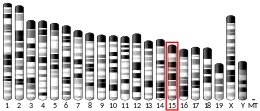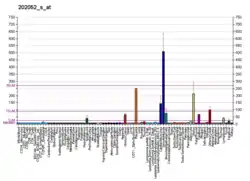RAI14
Ankycorbin is a protein that in humans is encoded by the RAI14 gene.[5][6] Ankycorbin has been associated with the cortical actin cytoskeleton structures in terminal web, cell-cell adhesion sites as well as stress fibres.[7]
| RAI14 | |||||||||||||||||||||||||
|---|---|---|---|---|---|---|---|---|---|---|---|---|---|---|---|---|---|---|---|---|---|---|---|---|---|
| Identifiers | |||||||||||||||||||||||||
| Aliases | RAI14, NORPEG, RAI13, retinoic acid induced 14 | ||||||||||||||||||||||||
| External IDs | OMIM: 606586 MGI: 1922896 HomoloGene: 9199 GeneCards: RAI14 | ||||||||||||||||||||||||
| |||||||||||||||||||||||||
| |||||||||||||||||||||||||
| |||||||||||||||||||||||||
| |||||||||||||||||||||||||
| Orthologs | |||||||||||||||||||||||||
| Species | Human | Mouse | |||||||||||||||||||||||
| Entrez | |||||||||||||||||||||||||
| Ensembl | |||||||||||||||||||||||||
| UniProt | |||||||||||||||||||||||||
| RefSeq (mRNA) |
| ||||||||||||||||||||||||
| RefSeq (protein) |
| ||||||||||||||||||||||||
| Location (UCSC) | Chr 5: 34.66 – 34.83 Mb | Chr 15: 10.57 – 10.71 Mb | |||||||||||||||||||||||
| PubMed search | [3] | [4] | |||||||||||||||||||||||
| Wikidata | |||||||||||||||||||||||||
| |||||||||||||||||||||||||
References
- GRCh38: Ensembl release 89: ENSG00000039560 - Ensembl, May 2017
- GRCm38: Ensembl release 89: ENSMUSG00000022246 - Ensembl, May 2017
- "Human PubMed Reference:". National Center for Biotechnology Information, U.S. National Library of Medicine.
- "Mouse PubMed Reference:". National Center for Biotechnology Information, U.S. National Library of Medicine.
- Kutty RK, Kutty G, Samuel W, Duncan T, Bridges CC, El-Sherbeeny A, Nagineni CN, Smith SB, Wiggert B (May 2001). "Molecular characterization and developmental expression of NORPEG, a novel gene induced by retinoic acid". J Biol Chem. 276 (4): 2831–40. doi:10.1074/jbc.M007421200. PMID 11042181.
- "Entrez Gene: RAI14 retinoic acid induced 14".
- Peng YF, Mandai K, Sakisaka T, Okabe N, Yamamoto Y, Yokoyama S, Mizoguchi A, Shiozaki H, Monden M, Takai Y (December 2000). "Ankycorbin: a novel actin cytoskeleton-associated protein". Genes Cells. 5 (12): 1001–8. doi:10.1046/j.1365-2443.2000.00381.x. PMID 11168586. S2CID 19149724.
Further reading
- Jin J, Smith FD, Stark C, Wells CD, Fawcett JP, Kulkarni S, Metalnikov P, O'Donnell P, Taylor P, Taylor L, Zougman A, Woodgett JR, Langeberg LK, Scott JD, Pawson T (August 2004). "Proteomic, functional, and domain-based analysis of in vivo 14-3-3 binding proteins involved in cytoskeletal regulation and cellular organization". Curr. Biol. 14 (16): 1436–50. doi:10.1016/j.cub.2004.07.051. PMID 15324660. S2CID 2371325.
- Yuan W, Zheng Y, Huo R, Lu L, Huang XY, Yin LL, Li JM, Zhou ZM, Sha JH (September 2005). "Expression of a novel alternative transcript of the novel retinal pigment epithelial cell gene NORPEG in human testes". Asian J. Androl. 7 (3): 277–88. doi:10.1111/j.1745-7262.2005.00040.x. PMID 16110356.
- Kutty RK, Chen S, Samuel W, Vijayasarathy C, Duncan T, Tsai JY, Fariss RN, Carper D, Jaworski C, Wiggert B (July 2006). "Cell density-dependent nuclear/cytoplasmic localization of NORPEG (RAI14) protein". Biochem. Biophys. Res. Commun. 345 (4): 1333–41. doi:10.1016/j.bbrc.2006.04.184. PMID 16729964.
- Ewing RM, Chu P, Elisma F, Li H, Taylor P, Climie S, McBroom-Cerajewski L, Robinson MD, O'Connor L, Li M, Taylor R, Dharsee M, Ho Y, Heilbut A, Moore L, Zhang S, Ornatsky O, Bukhman YV, Ethier M, Sheng Y, Vasilescu J, Abu-Farha M, Lambert JP, Duewel HS, Stewart II, Kuehl B, Hogue K, Colwill K, Gladwish K, Muskat B, Kinach R, Adams SL, Moran MF, Morin GB, Topaloglou T, Figeys D (2007). "Large-scale mapping of human protein-protein interactions by mass spectrometry". Mol. Syst. Biol. 3: 89. doi:10.1038/msb4100134. PMC 1847948. PMID 17353931.
This article is issued from Wikipedia. The text is licensed under Creative Commons - Attribution - Sharealike. Additional terms may apply for the media files.




